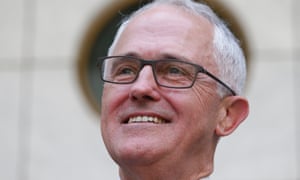Extract from The Guardian
It was an extraordinary performance in the worst possible sense of that word – the most powerful person in Australia rendered powerless by the complexity and vulnerability of his political position.
Malcolm Turnbull was asked three times in his parliamentary courtyard on Tuesday a very simple question: did he support the position taken by his immigration minister, Peter Dutton, that Lebanese Muslims should not have been permitted to come to Australia in the 1970s because a small number of their descendants generations down the track went on to be charged with crimes.
A simple question, repeated three times, lest the inquiry present as somehow ambiguous to a prime minister suffering jet lag after a night flight from Peru.
Turnbull heard the question clearly but he wasn’t able to answer.
He couldn’t support Dutton, he couldn’t condemn him.
The prime minister just had to stand there, smiling, face fixed into a mask, pretending, as if the meaningless formulations coming out of his mouth had any meaning – and inviting assembled journalists to buy into this fiction, to validate nonsense.
On Tuesday Turnbull smiled directly into the void of his own leadership, because publicly condemning Dutton – the most powerful conservative figure in the government – isn’t a viable option, not unless you want to go to war, not unless you have the appetite to play for keeps.
Malcolm Turnbull was asked three times in his parliamentary courtyard on Tuesday a very simple question: did he support the position taken by his immigration minister, Peter Dutton, that Lebanese Muslims should not have been permitted to come to Australia in the 1970s because a small number of their descendants generations down the track went on to be charged with crimes.
A simple question, repeated three times, lest the inquiry present as somehow ambiguous to a prime minister suffering jet lag after a night flight from Peru.
Turnbull heard the question clearly but he wasn’t able to answer.
He couldn’t support Dutton, he couldn’t condemn him.
The prime minister just had to stand there, smiling, face fixed into a mask, pretending, as if the meaningless formulations coming out of his mouth had any meaning – and inviting assembled journalists to buy into this fiction, to validate nonsense.
On Tuesday Turnbull smiled directly into the void of his own leadership, because publicly condemning Dutton – the most powerful conservative figure in the government – isn’t a viable option, not unless you want to go to war, not unless you have the appetite to play for keeps.
We have the rise of the faux everyman and woman, who happen, by accident, to reside in Canberra during parliamentary sitting weeks. As if that might sate people’s rage and alienation. As if engaging in front bar logic and national empathy tours will deliver some form of mass hypnosis, lulling voters into thinking the political class is something other than the political class.
The most bizarre thing is we have been here before, and with this government.
During the full apocalyptic period of Tony Abbott, where he was fully extended in a toxic political debate about watering down hate-speech protections, while at the same time whipping up national security messaging, the government realised it was travelling down a dangerous road.
Turnbull realised just how dangerous that road was and insisted on calming the conversation, which was one of his most comprehensive early achievements when he took the Liberal leadership last September.
So let me honour this legacy by saying today what Turnbull, our leashed prime minister, couldn’t bring himself to say.
Peter Dutton’s comments are ridiculous.
The immigration minister (of all people) is suggesting Australia should have a discriminatory immigration policy, a policy that discriminates against migrants of particular ethnic or religious origin on the basis that people connected with them in the future might be involved in criminal activity.
Only five seconds thought delivers the manifest absurdity of this statement. Not so much stopping the boats as stopping the grandkids.
Dutton’s comments are also inflammatory. The immigration minister is prosecuting a low-grade culture war against a community which is dealing with a radicalisation problem. A real problem, not an abstract one.
Radicalisation is a problem that requires trust, cooperation and clear lines of communication to be able to manage.
Cheap political points don’t deliver anything – except more alienation, more anger, more division, more suspicion – and that dynamic solves nothing, helps nothing, and no one.

No comments:
Post a Comment